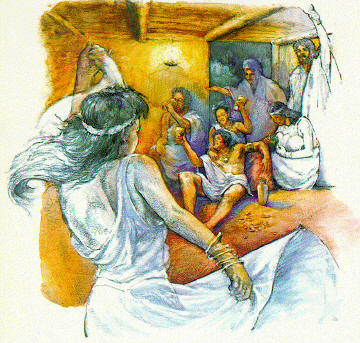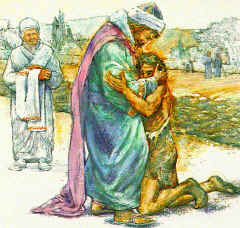The Gospels: Luke 15 – The Prodigal God
One of Jesus’ best-loved parables reveals far more about God’s love than we might at first think.
Most Christians are familiar with Jesus’ parable of the prodigal son. Some refer to it as the parable of the lost son. It’s found in Luke 15 in the New Testament. This wonderful story has been read by children and adults alike countless times. It never ceases to inspire us—even tug on our heartstrings as the father in the story lovingly accepts his errant son back.
A quick look at this parable reveals the example of a hasty young man who wastes his inheritance with lavish living while living in a foreign land (Luke 15:13). Matters are made worse when a severe famine grips his new homeland (verse 14). Desperate, he hires himself out to a man who lets him feed his pigs (verse 15). Hungry and humiliated, he decides to go home to his father, who receives him with open arms (verses 17-24).
 |
| “The younger son got together all he had, set off for a distant country and there squandered his wealth in wild living” Illustrations by Jody Eastman |
But there is more to the story than this—much more. Perhaps that’s why Norval Geldenhuys in The New International Commentary on the New Testament calls this story the ‘”Gospel within the Gospel.” To gain an enriched appreciation and understanding of this best-loved parable, let’s take a closer look at the Gospel of Luke, chapter 15. Let’s allow the story to take us back to the time when Jesus spoke what William Barclay in The Daily Study Bible Series calls ‘”The greatest short story in the world.”
Another confrontation
It was another testy meeting between Jesus and the religious leaders of Judea, the Pharisees. In their midst were “sinners” and tax collectors who had gathered to hear what Jesus had to say. Noting the makeup of the crowd that was gathering, the Pharisees and religious teachers began muttering about the kind of company Jesus was keeping, saying, “This man welcomes sinners and eats with them” (Luke 15:1-2).
This wasn’t the first time they had criticized Jesus and his disciples for associating with those the Pharisees considered to be off-limits. Sometime earlier, during a banquet given for Jesus by a tax collector named Levi, a group of Pharisees questioned Jesus’ disciples. The Pharisees asked, “Why do you eat and drink with tax collectors and “sinners’?” Jesus responded by saying: “It is not the healthy who need a doctor, but the sick. I have not come to call the righteous, but sinners to repentance” (Luke 5:29-31).
Hearing the same criticism later, pictured in Luke 15, Jesus again answered the Pharisees’ reproach. This time he chose to elaborate. He began by telling two parables: the first focusing on a sheep recovered after straying from a flock of 100, the second on one of 10 coins that had been lost and later found (Luke 15:3-10). Jesus explained each story’s significance: the great joy that takes place in heaven when a person involved in sin repents of his or her lost ways and is restored to a right relationship with God (verses 7, 10).
The third parable was the culmination of his response. For many readers, this third parable focuses on the prodigal son. Perhaps that is the person they can identify with the most. And indeed, in this story Jesus does illustrate a young man who had lived a profligate, wasteful life-style and who comes to his senses.
But the word prodigal can mean several things—negative or positive: recklessly extravagant, characterized by wasteful expenditure, lavish, yielding abundantly, luxuriant or profuse (Webster’s Ninth New Collegiate Dictionary’). The son was extravagant in a negative way, but the father was extravagant in a positive sense.
Christ’s parable also gives us a wonderful glimpse of God the Father’s tender, compassionate, even lavish love, as exemplified in the role of the father in the parable, for those who turn from their sins. As we examine this father’s actions, we can come to see how differently God views things than we do. “‘For my thoughts are not your thoughts, neither are your ways my ways,’ declares the Lord. ‘As the heavens are higher than the earth, so are my ways higher than your ways and my thoughts than your thoughts” (Isaiah 55:8-9).
| “After he had spent everything, there was a severe famine in that whole country, and he began to be in need. So he went and hired himself out to a citizen of that country, who sent him to his fields to feed pigs.” |
Freedom of choice
The father of the story complied without any complaint with his son’s headstrong wish to receive his inheritance for immediate use (Luke 15:12)—a request that was rarely granted in the Jewish society of Jesus’ day. The apparent ease with which the younger son’s desire was granted seems to suggest that the father gave his children great latitude in making choices.
Likewise, we too are constantly confronted with choices. It is up to each of us to choose our way in life. This is a privilege our wise, loving Father allows us, on the one hand, even while encouraging us to follow his way on the other. Just as we learn through many of our self-willed choices, the son in the story also came to understand that the way he had chosen did not bring him the happiness he sought (verse 17).
The son rehearsed what he would say to his father when he returned. He had sinned against God and his father, and he was no longer worthy to be his son. He wanted to be made just as one of his father’s hired servants (verses 18-19). And so he returned home.
The father saw his son while he was still some distance away, and was moved with compassion (verse 20). Some commentaries suggest that the father had been watching and waiting for his son’s return. The Expositor’s Bible Commentary suggests that the “father’s ‘compassion’ assumes some knowledge of the son’s pitiable condition, perhaps from reports” (vol. 8, page 984). This reminds us of what David records about God in Psalm 139:1-16.
Whatever the case, the elderly father did something uncharacteristic for the culture of the day: he ran to meet his son. Then he embraced and kissed him fervently, or many times, as the Greek verb also indicates.
As the son began to repeat the speech he had rehearsed, his father interrupted (Luke 15:21-22). Instead of allowing his son to offer his services as a hired servant—one who, as William Barclay notes, could be dismissed at a day’s notice—the father did something remarkable. He called for the “best robe” (a sign of position), a ring for his finger (a sign of authority) and shoes (reserved only for freemen) (verse 22).
The father ordered the fattened calf to be killed and a party to be organized to welcome his son home. “For this son of mine was dead and is alive again; he was lost and is found” (verses 23-24). The father welcomed his son back with great emotion and joy, and restored his son to a position of honor, not to that of a hired servant. It’s remarkable that our heavenly Father does the same with us.
When we sin, we separate ourselves from God (Isaiah 59:2). We leave the company of God’s family for a world influenced by Satan. Sin consumes us and destroys us—it leads to death (Romans 6:23). But when we repent, our sins are forgiven and we are restored to a right relationship with God —a restoration so complete, it is as if we never left the family (Acts 3:19; Isaiah 43:25).
The older son, upon learning of his brother’s return, was angry with his father. After all, hadn’t he remained loyal, slaving away for his father? He had never received even as much as a roasted goat in his honor. And “this son of yours” (a not-so-subtle sense of superiority here), who had wasted his inheritance on prostitutes comes home and gets a fattened calf!
 |
| “But while he was still a long way off, his father saw him and was filled with compassion for him; he ran to his son, threw his arms around him and kissed him.” |
How God views repentance
The older son reveals a lot about human nature. When we read the story, most of us have a hard time disputing his reasoning. What’s fair about a wasteful son returning home to a banquet while the loyal son who did everything that was asked of him received no such honor?
Jesus reminds us through the father’s response that God’s ways are not ours (Isaiah 55:8). The father gently acknowledged to his older son that he was aware that he had always been with him, and that everything the father had was his older son’s. But they had to celebrate the return of “this brother of yours” (a reminder of the older son’s relationship with his brother). It was not just necessary, “it was the right thing. The father had to do it. Joy was the only proper reaction in such a situation” (The Tyndale New Testament Commentaries, vol. 3, page 268).
When we repent, God restores us to the full honors due a child of God, regardless of our sins (Acts 3:19: 1 John 2:1-2). This is hard for human beings to grasp. But the lavish mercy and forgiveness of God, made possible by the perfect, willing sacrifice of Jesus Christ, are truly amazing. Indeed, one could say they are prodigal. Because if any point stands out in this parable, it is how lavish God is in his forgiveness and mercy.
Throughout this parable, Jesus illustrated to the “sinners” (speaking to each of us) that, just as for the wayward son, the way to repentance was wide open for them. To the Pharisees and religious teachers (also speaking to each of us), Christ showed that the people they looked down on so much, the “sinners” and tax collectors, were part of their family, too, and a slavish obedience to the law brings no spiritual reward in itself (Isaiah 1:11; Ephesians 2:8-9). It is God, by his grace and mercy, who rewards us (Romans 9:14-18).
The father in the story reveals the humanly incomprehensible love that God our Father has for each of us, and the earnest desire he has to forgive us and have a relationship with us. Far from being the story of the prodigal son, Luke 15 is more aptly the story of the prodigal God—one whose lavish, extravagant, luxuriant love for us can only amaze us on the one hand and give us great solace and comfort on the other.
Sources:
• Barclay, William. The Daily Study Bible Series, rev. ed. The Gospel of Luke. Philadelphia: Westminster, 1975, pages 203-206.
• Gaebelein, Frank E., et al., eds. The Expositor’s Bible Commentary, vol. 8. Grand Rapids: Zondervan, 1984, pages 982-985.
• Geldenhuys, Norval. The New International Commentary on the New Testament: Commentary on the Gospel of Luke. Grand Rapids: Eerdmans, 1988, pages 405-413.
• Morris, Leon. The Tyndale New Testament Commentaries, rev. ed.. Luke: An Introduction and Commentary. Grand Rapids: Eerdmans,1989, pages 262-268.
Author: D. Taylor, 1993

